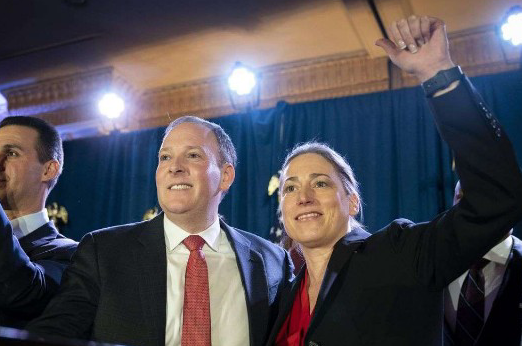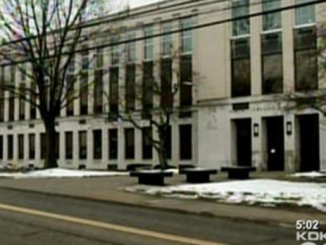
America’s cops are fed up.
They say they’ve been defunded, scapegoated as violent racists, vilified for the mistakes of a few rogue officers, and challenged by sharp increases in shootings and murders.
Now some are pushing back in a way they never expected: walking off the job to run for elected office.
There are more than 100 current or former police officers on the ballot this year for federal, state, and local offices, with more than 90 running for seats in their state legislature. Nearly all are running as Republicans.
The officers, some of whom have never run for office before, have tagged the movement as “the common sense wave.”
“There has been a war waged against law enforcement by Democrats and the far-left. and those of us who have worn the uniform, those of us that have respected law enforcement our entire lives, just can’t sit back anymore,” said Anthony D’Esposito, a former NYPD detective who is running for Congress as a Republican to represent a portion of Nassau County, New York.
The officers running for election have largely paralleled the Republican party’s broader strategy of labeling Democrats as soft on crime. It is an argument the GOP believes will win them control of the House and Senate in November at a time when America is awash in violent crime.
Alison Esposito, a former NYPD deputy inspector, retired this summer after 25 years on the job to run as the Republican nominee for lieutenant governor in New York, alongside Rep. Lee Zeldin, the GOP nominee for governor.
A second-generation cop, she had stints in plain clothes and anti-gang units before rising to become the commanding officer of Brooklyn’s 70th Precinct.
Ms. Esposito never thought about jumping into politics, but she couldn’t sit on the sidelines anymore after witnessing firsthand New York’s post-pandemic crime surge.
“I never wanted to retire, but I was watching the city that I love in turmoil and I realized I was sitting in the wrong seat and wearing the wrong hat to affect the type of change New York so desperately needs,” Ms. Esposito said.
Across the nation, former police officers are rising up to voice the concerns of their brothers and sisters in the halls of government, saying their voices are desperately needed to drown out anti-police rhetoric.
They say their law enforcement backgrounds are a potent argument to voters at a time when homicide rates in nearly two dozen cities are roughly 40% higher than they were before the pandemic, according to the Council on Criminal Justice. The officers say they’ve witnessed how less stringent criminal justice policies have sparked the crime surge.
Ex-cops are on the ballot in all kinds of races across the country, but their campaigns are largely similar. Most are running as Republicans with a law-and-order platform seeking to unseat a Democratic incumbent.
In Virginia, former police officer and sheriff Yelsi Vega is campaigning against Rep. Abigail Spanberger, a Democrat, for a U.S. House seat.
Former Rochester, New York Police Chief La’Ron Singletary resigned from the force to challenge Rep. Joseph Morelle, a Democratic, for Congress.
So many officers in suburban Pittsburgh are pursuing local positions ranging from school board members to district justice, it sparked a debate over a state law banning civil servants from holding office.
“This is not a red wave or a blue wave. It is a common sense wave,” Ms. Esposito said. “It is people who never ran for office before standing up and saying, ‘enough.’ Freedom and public safety and security are on the ballot, and so is common sense.”
NEW YORK EPICENTER
New York state appears to be the epicenter of this trend, with at least 11 former police officers and five immediate family members of current officers running for a mix of state and federal positions. Another two ex-officers had mounted campaigns this year but were eliminated in the primary.
New York state legislators in recent years have approved a series of bills aimed at reducing the jail and prison population, including laws eliminating cash bail for low-level nonviolent crimes such as arson, robbery, burglary, and drug offenses.
The Republican former cops have hammered the legislature and Gov. Kathy Hochul, a Democrat, over bail reform, saying there are too many criminals who have been released only to commit more severe crimes.
Statistics released last week by the New York Criminal Justice Services did little to appease either side.
The data showed that statewide, monthly rearrest rates rose sharply starting in late 2019, when judges began applying bail reform.
Statistics released last month by New York City Mayor Eric Adams, a Democrat, concluded that suspects arrested for burglary in the city who went on to be arrested for another felony within 60 days jumped to 25.1% this year, compared with 7.7% in 2017. That works out to roughly 373 individuals rearrested this year by the NYPD.
Other crimes deemed to be low level for cashless bail also showed marked increases in rearrest rates. Felony rearrests for defendants accused of grand larceny jumped to 16.8% this year from 6.5% in 2017, while felony rearrests for shoplifting rose to 21.2% in 2022, compared with 8.1% in 2017.
Democrats have disputed Mr. Adams’ numbers, saying they don’t indicate how many of those defendants were assigned bail. Instead, they point to data from the New York State Unified Court System, which suggests that people released without bail re-offend at the same rate as those who are held on bail.
Those numbers show that statewide since 2020, an average of 9.6% of defendants arraigned for a misdemeanor have reoffended. Of that total, 7% were charged with a nonviolent felony, and 2.6% were rearrested and charged with a violent felony.
“I think there is, obviously, disagreement on the numbers, but common sense says this increase in crime, the increase in violent crime is directly tied to bail reform,” said Scott Marciszeski, a retired police officer who is running as a Republican for a suburban Buffalo New York State Assembly seat. “The criminals know when they are apprehended there will be no accountability.”
He said when he knocks on doors to meet with voters, all they want to talk about is “crime, crime, crime.”
Mr. Marciszeski also pointed to nearby Kenmore, New York, which recorded its first homicide in years. He said the town was nicknamed, “Mayberry,” a reference to the quaint village that served as the setting for The Andy Griffith show.
If elected, Mr. Marciszeski said his first goal is to repeal New York’s cashless bail laws.
CANDIDATES DOVETAIL WITH GOP STRATEGY
A Washington Post-ABC News poll released this week found that 56% of voters said they trust Republicans more to handle crime, while 34% said Democrats trust Democrats more on the issue.
The former officers are seizing on that gap on the campaign trail, highlighting incidents of violence and horrifying crimes.
At a press conference this month, Ms. Esposito and Mr. Zeldin detailed the story of Scott Saracina, who was released without bail in February on charges of harassing and stalking a woman. He was rearrested in early September, accused of abducting and raping a woman.
During the first three weeks of September, Republican candidates across the country aired 53,000 commercials on crime, according to data from AdImpact, which tracks political messaging on television.
Crime has long been a political liability for Democrats, and the GOP messaging has put them on the defensive. Several top Democrats have scrambled to distance themselves from the defund-the-police movement, with even President Biden calling for more cops on the streets.
At the same time, the emphasis on crime has sparked criticism that the officers are single-issue candidates avoiding tougher political fights on issues such as inflation and abortion. The officers strongly reject such criticism.
“I don’t know a single former police officer that is running a single-issue candidacy,” said James Coll, a retired NYPD detective running for New York state Senate. “They are campaigning on issues across the board from high taxes to COVID restrictions to state budgets that spend money on things that we don’t need.”
* Article from: The Washington Times


